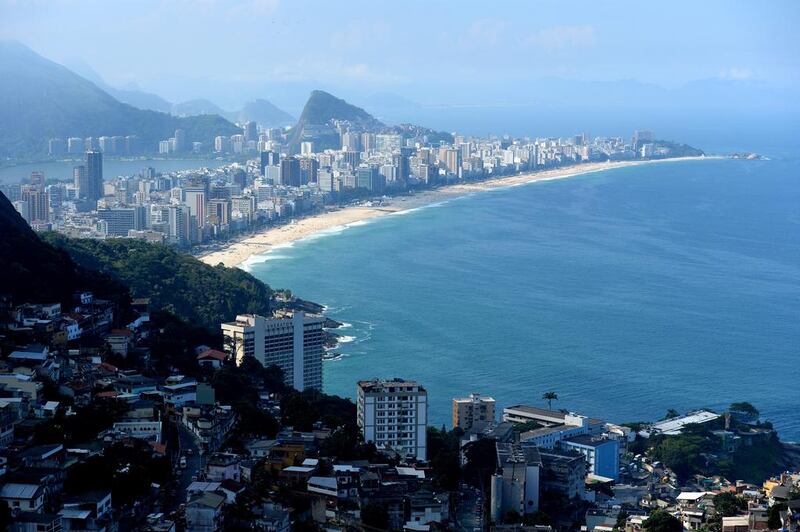The flight from Porto Alegre arrives on time at Rio de Janeiro’s Galeao international airport, 15 kilometres north of the city centre. The Boeing 737 sits in the midday sun for 20 minutes until a gate is available.
Passengers depart and walk to the arrivals hall, where no details of the baggage carousel appear on the screen. Thirty-two minutes after the plane met the gate, baggage starts to appear. Then the carousel stops; a suitcase is trapped. An employee is sufficiently distracted from her mobile phone to summon help.
When two men yank the offending suitcase free, luggage rolls again. An hour after the plane touches down, passengers are finally reunited with their bags.
“This is normal,” says Victor Soccol, a Rio accountant who recently returned back to his homeland after working in Atlanta, Georgia. “That’s how things work there. Slowly. From the internet to traffic, to picking your bags up at the airport. You become used to it. This is Brazil.”
For visitors at the airport, internet access can only be achieved after jumping through endless hoops. One provider requires 28 pieces of information before declining three different credit cards. Several more offer their services only in Portuguese.
Brazil, the world’s fifth biggest country by area and seventh biggest by Gross Domestic Product (GDP) – with an economy equivalent to South Africa, Argentina and Australia combined – is one of the emerging Bric economies alongside Russia, India and China.
It may have won more World Cups than any other country, but it is 56th in the world competitiveness index and its GDP per capita is 81st, with huge disparities between rich and poor. The average wage in the Distrito Federal, which includes the capital Brasilia, is equivalent to the average German wage. In Piaui in the north, it is seven times less and similar to Mongolia.
The inequalities in many areas of Brazilian life are evident as the taxi heads towards the city centre, passing eight kilometres of favelas which stretch until they hit verdant forested hills so steep that it is impossible for human habitation.
The ageing stadium of Vasco da Gama appears, then the gleaming white clad roof of the Maracana, which will stage July’s World Cup final, in the distance. The motorway swings by the docks and the huge British cruise liner Queen Victoria, its high rise luxury looking down towards the offices of downtown.
Rio hopes for more tourists before, during and after the 2104 World Cup finals and the 2016 Olympic Games. It boasts enough natural assets. There is not a major city on earth so blessed by its location.
Travel beyond Centro, the downtown area, towards the more affluent southern beaches of Botafogo, Flamengo, Copacabana, Ipanema and Leblon and you enter another world to the northern favelas.
Here, Atlantic waves crash on beaches from which fairy-tale forested mountains rise steeply. There are the peaks of Sugar Loaf and Corcovado, with its huge statue of Jesus Christ overlooking a lake and sizeable chunk of South America’s most expensive real estate.
It is so expensive that Cariocas – the name for Rio residents – are complaining about prices of everything from bread to a restaurant meal. Even their weakening currency has made little difference.
The complainers are surrounded by beauty in the landscape, people and stunning architecture. Music sounds everywhere on the beaches, from under thousands of umbrellas providing shade. Space is found for beach soccer, volleyball and a mixture of the two. The dexterity on show, the flicks, are staggering.
Nearby, patrons drink from freshly sliced coconuts, posters advertise the host city status of Rio in the World Cup, machines spray mist onto baked pedestrians as police and private security watch on. Visitors will enjoy Rio’s agreeable assault on the senses, a city full of chaotic soul, but it is a troubled place. “There are worries but we’ll be OK,” says Pedro Wilson Silveira, a businessman, who has paid US$1,000 (Dh3,670) for two tickets to see Brazil in the first round of the knockout stages.
“I bought hospitality because the normal tickets sold out,” he says. “We staged the Confederations Cup and it was wonderful. The World Cup will be even better.”
Rio’s metro system is not extensive for a city of six million, but the two lines are efficient, the trains air-conditioned and safe.
Huge distances between cities – fellow host city Manaus is a four-hour flight from Rio – means creating an infrastructure will take time in Brazil’s growing economy, but one frustration of its people is that not enough is being done, that Brazil is missing its chance while their economy is growing. Some Brazilians are embarrassed by their airports and have little confidence that politicians can do much about them.
Before the flight out of Rio, traffic jams dominate the television news. The city has changed traffic flow close to the city’s domestic airport. Roads are shown at gridlock, frustrated passengers complain at having missed their flights. Brazil’s growing pains are all too evident as the World Cup draws ever closer.
sports@thenational.ae






